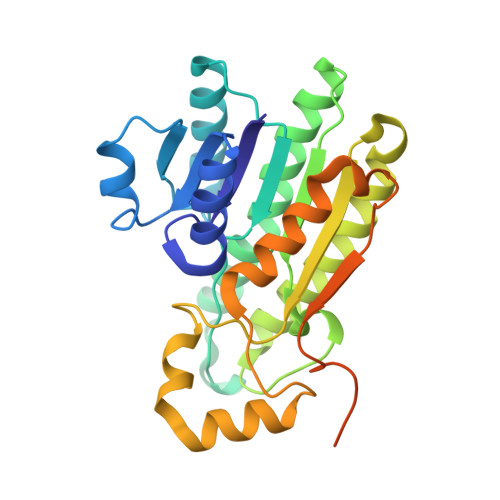Engineering a short-chain dehydrogenase/reductase for the stereoselective production of (2S,3R,4S)-4-hydroxyisoleucine with three asymmetric centers.
Shi, X., Miyakawa, T., Nakamura, A., Hou, F., Hibi, M., Ogawa, J., Kwon, Y., Tanokura, M.(2017) Sci Rep 7: 13703-13703
- PubMed: 29057974
- DOI: https://doi.org/10.1038/s41598-017-13978-w
- Primary Citation of Related Structures:
5GWR, 5GWS, 5GWT - PubMed Abstract:
Fenugreek is a dietary supplement for anti-aging and human health. (2S,3R,4S)-4-hydroxyisoleucine (4-HIL), which is extracted from fenugreek seeds, is expected to be a promising orally active drug for diabetes and diabetic nephropathy because of its insulinotropic effect. Although several chemical synthesis methods of 4-HIL have been proposed, these methods require multistep reactions to control the stereochemistry of 4-HIL. In this study, we modified the key enzyme 4-HIL dehydrogenase (HILDH) to overcome the biggest limitation in commercial-scale production of 4-HIL. As a result, an effective one-step carbonyl reduction to produce (2S,3R,4S)-4-HIL was successfully accomplished with strict stereoselectivity (>99% de). Mass production of (2S,3R,4S)-4-HIL by our synthetic method could have a significant contribution to the prevention of diabetes, dyslipidemia, and Alzheimer's disease. (120 words/200 words).
- Laboratory of Basic Science on Healthy Longevity, Department of Applied Biological Chemistry, Graduate School of Agricultural and Life Sciences, The University of Tokyo, 1-1-1 Yayoi, Bunkyo-ku, Tokyo, 113-8657, Japan.
Organizational Affiliation:


















